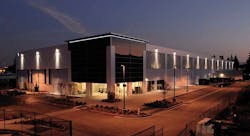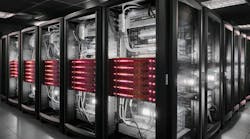Digital Bridge: A Vision Spanning Wireless, Towers and Data Centers
As the new consolidator in the data center industry, Digital Bridge has a vision that extends from the device in your hand to the server in the data center. With new technologies on the horizon that will require ubiquitous connectivity and massive data storage, it sees opportunity everywhere.
“We want to be involved along that path, in all the unique parts of network and Internet infrastructure,” says Marc Ganzi, the CEO of Digital Bridge. “The combination of fiber and towers and (data center) nodes works together. Our belief is that these network infrastructures will start to merge.”
With today’s acquisition of Vantage Data Centers, Digital Bridge has taken another major step towards that vision. The Vantage deal provides a vehicle for Digital Bridge to expand in the fast-growing world of wholesale data centers, where cloud providers lease server space by the suite, and sometimes by the entire building. It is using last year’s DataBank acquisition as a platform for retail colocation, which sells IT space by the cabinet and cage, and has already made several “tuck-in” deals to add capacity in new markets.
Veteran Players in Wireless Towers
Although Digital Bridge is a new company in the data center sector, its principals are among the most experienced players in wireless real estate. CEO Ganzi and Chairman Ben Jenkins founded the company after playing similar roles for a decade at Global Tower Partners (GTP), the largest privately owned operators of telecom towers. The company was created in 2002 and built a portfolio 16,000 sites before it was acquired by American Tower for $3.3 billion in 2013.
Ganzi and Jenkins founded Digital Bridge in 2013 with a “singular focus” on owning and operating communications infrastructure companies with strong cash flow. That vision started with wireless infrastructure, but extended to a broader universe of connectivity and data storage companies:
- In 2014 it backed Vertical Bridge, which was acquired extensive infrastructure to host wireless connectivity, including 3,500 owned wireless and broadcast towers, 4,000 master lease rooftop and towers and more than 39,000 billboards.
- It owns ExteNet Systems, which provides wireless connectivity through distributed antenna systems (DAS), small cells, WiFi and radio access networks (RAN) to extend wireless signals.
- In the data center sector, Digital Bridge now owns Vantage Data Centers and DataBank, which has subsequently acquired C7 Data Centers of Salt Lake City and facilities from 365 Data Centers in Cleveland and Pittsburgh.
- Digital Bridge also owns two companies that operate networks of telecom towers across Mexico, Columbia and Peru.
“I’ve spent the vast majority of my career building tower businesses,” said Ganzi, who has been scouting and acquiring towers and sites since the 1990s. During those early days, he connected with Michael Foust, who then worked at real estate firm CB Richard Ellis. Foust later helped found the private equity firm GI Partners, and became the CEO of Digital Realty Trust, which became the world’s largest operator of technology real estate.
Building A Data Center Team
As Ganzi began assembling the various elements of his vision for Digital Bridge, he knew who to call about the data center component.
“The last missing piece was Internet infrastructure,” said Ganzi. “One of the first people we went to see was Mike Foust. We finally had this window to come together. Mike agreed to come on board and help start our Internet infrastructure practice.”
One of the Databank data center facilities in the Dallas market. (Photo: Digital Realty)
Foust, who retired from Digital Realty in 2014, quickly sought out experienced data center executives for the Digital Bridge team, adding former IO chief financial officer Jon Mauck as well as Raul Martynek, formerly the CEO of both NetAccess and Voxel dot Net. Mauck is now a board member and CIO at DataBank, while Martynek joins the board at Vantage.
Connecting a Growing Universe of Things
With its data center strategy coming together, Digital Bridge is realizing the ambition embedded in its name – serving as a connector between the wireless antennas and towers required to move packets, and the data centers required to analyze and store that data.
It is a vision built for the next decade, in which mobile and cloud will serve as the enablers of a digital revolution, accelerated by new technologies like artificial intelligence (AI), the Internet of Things, virtual reality, drones, robots and autonomous vehicles. All of these innovations promise to disrupt business and society, enabling cutting-edge technologies to deliver apps and services to an exploding universe of distributed devices.
These trends are also reshaping infrastructure, as we’ve been reporting here at Data Center Frontier. Streaming video and the IoT are driving content closer to the end user, boosting demand for edge computing. A hybrid network will emerge featuring fiber in new places and lots of wireless, boosting data capacity and coverage density with small cells and distributed antenna systems. As data volumes explode, we’ll see data centers in new places. The network will be everywhere.
Digital Bridge aspires to be almost everywhere the network goes. Its business model spans verticals, and is flexible in its approach to underwriting deals, working with a range of investors. The result is a loosely coupled universe of businesses that each has its own mission, focus and investors, but can work across sectors to extend their reach.
Separate But Connected
An example, Ganzi said, is the potential use of data center infrastructure to support radio access networks, housing radio rooms in data centers or edge facilities where they can tap into ecosystems of content customers via interconnects.
This has particular upside for the Internet of Things. ExteNet has 800 utility poles and street lights in San Francisco that are entitled for small cell antennas to boost mobile signal density. As that network grows, Vantage can offer supporting infrastructure at either existing facilities or new edge sites. Similar cooperation could see DataBank supporting ExteNet infrastructure in Chicago.
Ganzi’s background in the telecom business reinforces the importance of entitlements for future infrastructure. In wireless that can mean lining up space on rooftops, poles or towers. “We have to partner with folks that understand the entitlements,” said Ganzi.
An illustration of what the Vantage V6 data center will look like upon completion. (Image: Vantage Data Centers)
With data centers, that means land. Digital Bridge was impressed with the Vantage team’s ability to create expansion opportunities in the supply-constrained data center market in Santa Clara, where development sites are limited. Vantage CEO Sureel Choksi and Chief Operating Office Chris Yetman looked at 96 different sites in Santa Clara before procuring a property on Mathew Street that will support four data centers and up to 69 megawatts of IT capacity.
“Santa Clara is a unique market and there’s not a lot of good entitled locations left,” said Ganzi. “Sureel had an understanding of the on-ramp over the next five years and the demand that was coming onto the market. Sureel and Chris Yetman did their homework.”
End-to-End Capabilities
Digital Bridge isn’t the only new player in the data center sector seeking to bring together diverse assets. Another is Stonepeak Infrastructure Partners, a private equity firm which recently acquired Cologix, a regional data center network focused on interconnections. Stonepeak is a partner with Digital Bridge on Vertical Bridge and ExteNet, and also has built a portfolio of companies in natural gas, solar energy and microgrids.
The entrance of these companies is an intriguing trend for the data center industry, which historically has been the domain of specialists. Companies like Digital Bridge and Stonepeak bring different skills than some of the telecom firms that have struggled with their cloud-focused data center deals – such as Verizon and CenturyLink, which each recently divested billions of dollars in acquired data center and cloud assets to experienced data center companies.[clickToTweet tweet=”Digital Bridge CEO Marc Ganzi: We’re not afraid to build. We’re not afraid to buy. We’re not afraid to repurpose.” quote=”Digital Bridge CEO Marc Ganzi: We’re not afraid to build. We’re not afraid to buy. We’re not afraid to repurpose.”]
“We’re very adapt at buying stabilized assets with cash flow,” said Ganzi. “We’re not afraid to build. We’re not afraid to buy. We’re not afraid to repurpose. We really have the ability, as an operator, to go end to end.”
Ganzi believes this strategy lays the groundwork for Digital Bridge to benefit from the rising tide of business from the ongoing digital disruotion.
“We’re not quite at the Big Bang yet,” said Ganzi. “But the fact that we have our businesses working together on this is exciting.”
About the Author



